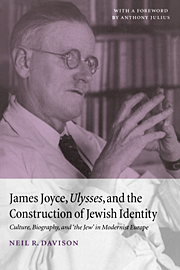 James Joyce, Ulysses, and the Construction of Jewish Identity
James Joyce, Ulysses, and the Construction of Jewish Identity Book contents
- Frontmatter
- Contents
- Foreword by Anthony Julius
- Acknowledgements
- List of abbreviations
- Introduction
- 1 Silence: family values
- 2 Silence: Jesuit years – Clongowes and Belvedere
- 3 Silence: university years – the Church, Dreyfus, and aesthetics
- 4 Exile: excursion to the Continent, bitter return
- 5 Cunning and exile: Greeks and Jews
- 6 Cunning: Jews and the Continent – texts and subtexts
- 7 Cunning: the miracle of Lazarus times two – Joyce and Italo Svevo
- 8 Ulysses
- Conclusion
- Notes
- Select bibliography
- Index
Introduction
Published online by Cambridge University Press: 05 April 2012
- Frontmatter
- Contents
- Foreword by Anthony Julius
- Acknowledgements
- List of abbreviations
- Introduction
- 1 Silence: family values
- 2 Silence: Jesuit years – Clongowes and Belvedere
- 3 Silence: university years – the Church, Dreyfus, and aesthetics
- 4 Exile: excursion to the Continent, bitter return
- 5 Cunning and exile: Greeks and Jews
- 6 Cunning: Jews and the Continent – texts and subtexts
- 7 Cunning: the miracle of Lazarus times two – Joyce and Italo Svevo
- 8 Ulysses
- Conclusion
- Notes
- Select bibliography
- Index
Summary
[In 1938] when a young Harvard student wrote to him to praise Ulysses but complain of Joyce's attitude toward his race, Joyce remarked, “I have written with the greatest sympathy about the Jews.”
Richard Ellmann, James JoyceSixteen years after the publication of Ulysses, James Joyce remained sensitive to the controversy of Leopold Bloom's “Jewishness.” Nearly sixty years later, and despite an often undervalued wealth of argument on the subject, we ourselves are still contending with the “indeterminacies” of Bloom's Jewish identity, as well as with the role of “the Jew” in the novel. While fin-de-siècle discourse about “the Jew” informs Bloom's character throughout the text, within the framework of Judaic law, he cannot of course be considered Halachically Jewish. A few readers of the novel, moreover, may continue to assert that – despite efforts on Joyce's part to the contrary – Ulysses perpetuates pernicious Jewish stereotypes. It is less arguable, however, that a multitude of European cultural markers of “Jewishness” are critical to Joyce's construction of Bloom's inner-life as well as to his subject position. In this manner, a study of the extrinsic forces that impacted on both Joyce and his work is central to an understanding of “the Jew” in Ulysses. But contextual analysis alone cannot evince the meanings of the text's representations of “the Jew”; Joyce's narrative experiments also play a decisive role in such an endeavor, and often render intricate portrayals of Bloom's plight as a marginal Jew. Bloom's “Jewishness,” then, whatever we discover it to be, cuts across both form and content, becoming pivotal to the representational, narratological, and even historiographical aspects of the novel.
Information
- Type
- Chapter
- Information
- James Joyce, Ulysses, and the Construction of Jewish IdentityCulture, Biography, and 'the Jew' in Modernist Europe, pp. 1 - 15Publisher: Cambridge University PressPrint publication year: 1996